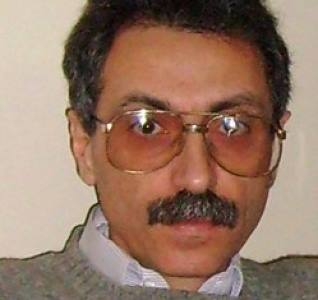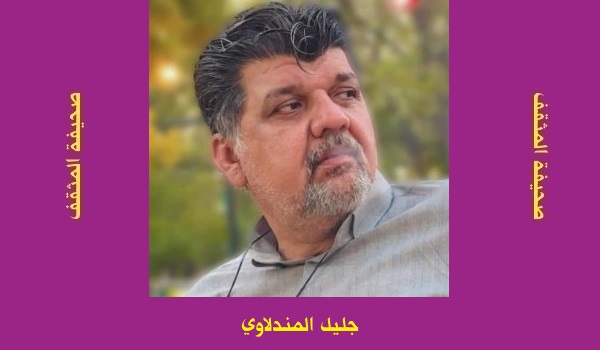ترجمات أدبية
ابن كافكا..
 قصيدة من أرشيف فيليب تيرمان
قصيدة من أرشيف فيليب تيرمان
صالح الرزوق
Son of K.
Philip Terman
“Few persons left behind so slender a trail as this child of Kafka’s.”
Max Brod
Mazel tov. I learned the news from the chronology
in the back of Schocken’s Complete Stories. A son!
Kayn anyhora, may you avoid the evil eye.
My own child’s sleeping now, long day, the playground,
the sandbox, coloring, chasing me around the house—
me, a father! Not much writing today, but when I toss her
into the air, her hair splayed wild, her eyes wide,
skin flushed, arms flapping like a bird’s, the air stills,
it seems for those few moments time stops completely.
Too bad you weren’t informed. Let me fill you in:
born 1914 or 1915. In Munich. His name?
Characteristics? How he died? Was he frail?
A little awkward? Large-eared? Lanky?
Did he keep to his room?
Did he have difficult eating habits?
Obsessed with the slightest noises? Give
mama a hard time? Harbor resentments
and imagine little ridiculous things about his father?
That would be you, of course, don’t feel guilty,
it wasn’t your fault, you had no idea, nobody did,
until twenty-five years later, except, of course,
the Mutter who, on April 21, 1940, identified you
in a letter—not, it’s true, by name, but what other
famous man whose “greatness is held to this day”
died in Prague in 1924? What about the mother?
Can you guess? You were delighted that she shares
a name with your insect’s sister, yes: Grete,
your fiancée Felice’s friend, her go-between
when there was a pause in your correspondence,
the one she trusted, an intermediary, the messenger you fell for.
Don’t deny it. Re-read your letter dated May 2, 1914,
the time, according to calculations, when little Franz Jr.
would have been born: you cannot be fully aware, you pined,
of what you mean to me. And this from a writer whose reputation
doesn’t rest on his superfluity: Everything you do, especially
your gaze, has its effect, Fraulein Grete, it has its effect.
Canetti says that if one reads your letters to Felice
and to Grete, often written on the same day, side by side,
“One can have no doubt as to whom he loves.”
And didn’t you want G to move in with you and F.
after the wedding? Can engaged couples do that?
And didn’t you tell G. that your relationship with her
holds delightful and altogether indispensable possibilities?
And didn’t you want G. to join you and F at Grund?
And didn’t you write G. about your unmistakable longing?
Max thinks the impact on you would have been enormous,
there was “nothing he desired more fervently” than children,
you “longed to be a father,” you “would have taken loving charge.”
Perhaps, Max thought, it might even have saved your life.
And didn’t you tell your own father, in that famous letter,
that To get married, to found a family, to accept
all the children that arrive, to maintain them in this
uncertain world, even to lead them a little on their way
is the most a man may succeed in doing?
Max again: “He longed to sit beside a cradle of his own.”
I’ve laid my pen down and sat beside a cradle
of a child of my own and stared into all that mystery and wondered
what she was imagining on the other side of language,
shapes of water and the dark, patterns of the sky,
what she made of this enormous shadow I cast over her.
She curled her tiny hand around my writing finger
and held it tightly gripped all the way into her sleep,
like holding fast to a rope fastened to this world,
floating in that great enigma that is her life,
what I will never know, the way two people, no matter
how close, are lost to each other, the way nobody
really knew you, not even Max, how you wrote
to Felice: I would never expose myself to the risk
of being a father, because what you had to do
was to become clear about the ultimate things.
So how could you be a father? Arranging your life
completely around your writing with a child in the house
when you could never be alone enough, there could never
be silence enough, sitting in your innermost room
of the locked cellar, notebook on a table and a lamp,
someone placing food outside the entrance? Last night,
my daughter came into my study and yelled: Papa!
I turned from this page and lifted her on my lap,
I swirled away from my desk and twirled her around,
she climbed onto my back and I crouched down like a horse,
she laughed hysterically, I stretched my back up and neighed.
No: even the noise in the next apartment congealed your blood.
Better off you never knew about him, this Franz Jr.
And besides, maybe you’ll be relieved, the whole shtick
about the son, I discover, despite Schocken’s chronology,
despite Max’s certainty, is now in dispute.
Scholars are saying the fellow didn’t even exit.
Other than the woman’s claim, there’s no proof,
none of her friends thought it possible, the researchers
don’t think anything intimate took place at all.
In early spring, 1914, Grete showed no signs in the stomach
and, though in 1916, she complained of “sufferings,”
the dates don’t work out. The story, says the biographer
Frederich Karl, falls too closely into the realm of a fantasy
of a woman spurned. The editors of the Letters to Felice
concur: “doubtful.” “Unlikely.” On the other side, Karl
speculates there might have been a “consummation,
even without proof.” Let’s allow Canetti the final word:
“Whatever occurred between G. and K. remains secret.”
Such are the ambiguities of history. Was there a son?
Would you have wanted there to be? How…Kafkaesque!
Brod, we know, thought a son would have confirmed
your worth from the “highest court of appeals,” the verdict
pronounced: not guilty, the message finally arriving
from the Castle. But of course nothing arrives from the Castle,
nothing definite, what we can be sure of, lay our hands on,
all agree with, you taught us that, that was your burden,
oh great father of Modernism. Was that spoken like a true son?
That’s all from Gerte, no more words, only the letter,
April 21, 1940. According to the Red Cross,
she was arrested in Italy after Hitler’s occupation.
Max received reports that a soldier “beat her
to death with the butt of his gun.” And so this son
trails off, slender as you are, almost an airy nothing,
a small passage in an obscure letter, another soul
who may or may not have existed, whose legacy
is otherwise annihilated, one more mystery, a perfection
that you would have chosen for yourself.
Every day you wished yourself off this earth,
preferring, you told your father, the absolute nothing
over the alternatives: marriage and fatherhood.
You said you would mature from childhood into old age
and bypass manhood completely, another statement
we’re forced to agree with: at forty, near death, a wisp
of gray in your hair, your expression almost Chinese,
a comparison the great Chinese scholar Arthur Whaley,
wouldn’t argue against, he said you’re the “only writer
in the western world who is essentially Chinese,”
and you yourself wrote to Felice: Indeed, I am Chinese.
What a coincidence! So’s my daughter! Adopted,
there’s the wisdom of 5000 years in her expression,
her ancestors surely worked on the Great Wall,
her eyes remind me of Tu Fu’s, but that’s kvelling,
everything she does is astonishing, she’s opening those eyes now,
she’s leaping across the room, she’s waving her arms: Papa!
...................
ينظر فيليب تيرمان لسيرة حياة كافكا من نقطتين:
الأولى روحية. أنه متصوف يهودي يعيش أزمته الحضارية مع الدين والوعي بطريقة تعكس حالة القلق العام الذي تزامن مع منعطف الحداثة الثاني ومع تهيؤ أوروبا لحرب عام 1945.
الثانية شخصية. فحياة كافكا يغلب عليها العصاب وعصفت بها مجموعة إشكالات إنسانية منها النساء وعلاقته بالمجتمع والمهنة. ويبدو أن خلفيات تيرمان ليست بعيدة عن ذلك. ويمكن أن تعلم من أشعاره ومقالاته أن زوجته الأولى انتحرت. وأن الثانية عانت من مرض السرطان. و أنه لم ينجب أبناء وعمل على تبني طفلتين صينيتين من بكين.
لقد وضعت هذه الظروف حياة تيرمان على الحد الفاصل بين الواقع والخيال. مثلما فعلت بكافكا قبله. حينما وضعت حياته على الحد بين النور والظلام. عاش كافكا حياة رمادية تخللتها تكهنات. ومنها ابنه المزعوم من غريت مع أن أشهر النساء في حياة كافكا هي ميلينا.
في هذه القصيدة حوار درامي بين تيرمان ورسائل كافكا. ولم أعمل على ترجمتها كي لا افسد إيقاع اللغة الأصلية وصيغ و تراكيب تيرمان.
فهي أصيلة وخاصة ويصعب نقلها إلى لغتنا ولا سيما بسبب ما ورد فيها من كلمات و صيغ بالعبرية.
نشر تيرمان 4 فقرات من هذه القصيدة الطويلة في مجموعته “رجال دين من حولنا” وأعاد بها تركيب جو حياة كافكا، بعد زيارة إلى بيته في براغ، وناقش فيها تفاصيل غرفة نومه وغرفة المعيشة وما تراه بالعين المجردة من نافذة البيت. وانعكاس ذلك على جوه الموحش والقوطي والغامض الذي تتميز به كتاباته. وهو ما يقول عنه تيرمان: حين لا تكون وحدك لا تستمتع بما يكفي من الصمت. وكأنه يعيد للذهن افتراض فوكنر: أن المجتمع غير المتجانس، أو المشحون من داخله، يكون عرضة للتفكك البطيء قبل الانفجار.
يتعرض تيرمان في قصيدته كذلك للعلاقة بين الحضارات من زاوية التآخي والتثاقف وليس الصدام. ويربط بين قصص كافكا الصينية وبين الحقيقة العجيبة: أنه أب أمريكي لابنة من الصين. وقد تحفظ الناشر على هذه الفقرة من القصيدة التي من المتوقع أن تظهر في مجموعة قادمة.







